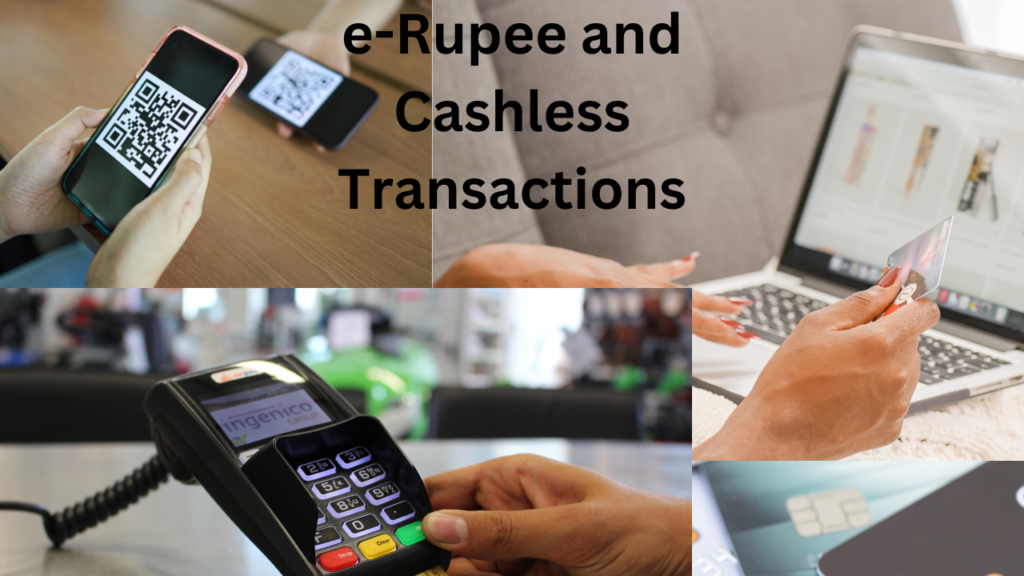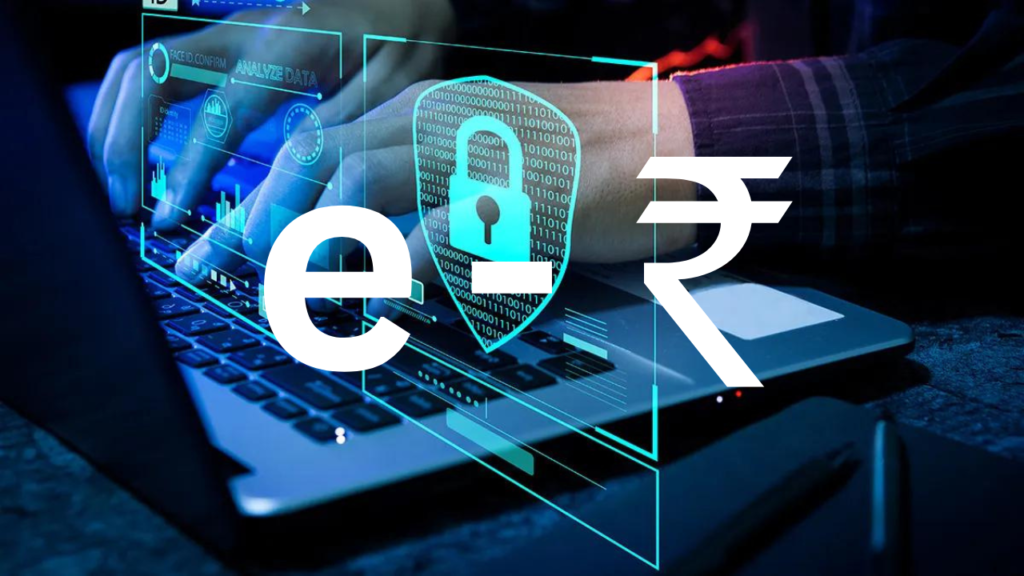Introduction

In today’s rapidly evolving digital landscape, the concept of currency is no longer confined to physical banknotes and coins. With technological advancements, digital currencies have emerged as a transformative force in the financial world. One such digital currency that is gaining traction is the e-Rupee, which is India’s digital equivalent of its national currency, the Indian Rupee.
Advantages of e-Rupee
Convenience and Accessibility
The foremost advantage of the e-Rupee lies in its unparalleled convenience to users. With the e-Rupee, individuals can conduct transactions seamlessly through their smartphones or other digital devices. Gone are the days of waiting in long queues at banks or ATMs. Whether it’s making purchases online or transferring funds to friends and family, the e-Rupee empowers users with instant and hassle-free transactions.
Financial Inclusion and Empowerment
One of the key objectives of introducing the e-Rupee is to promote financial inclusion. In a country as diverse as India, a significant portion of the population remains unbanked or underbanked. Digital Rupee bridges this gap by providing a secure and accessible platform for financial transactions to all, including those in remote areas. This empowerment can lead to greater economic participation and upliftment of underprivileged communities.
Enhanced Security and Fraud Prevention
Traditional cash transactions are vulnerable to theft, counterfeiting, and various forms of fraud. Digital Rupee, on the other hand, incorporates robust security measures, making it significantly more secure than physical currency. Advanced encryption techniques and biometric authentication ensure that Digital Rupee transactions are protected from potential threats, providing users with peace of mind.
Cost-Effectiveness and Efficiency
The adoption of the Digital Rupee contributes to cost savings for both individuals and financial institutions. Cash handling and management involve considerable expenses, including printing, distribution, and security. By transitioning to e-Rupee, these costs are minimized, leading to more efficient financial operations.
e-Rupee and Cashless Transactions

The proliferation of Digital Rupee a pivotal role in driving India’s transition towards a cashless society.
Transforming Payment Systems
Digital Rupee is at the forefront of transforming payment systems in India. It facilitates contactless payments, enabling users to make transactions swiftly and securely, without the need for physical currency or cards. This transformation gradually reduces reliance on cash and checks, leading to a more efficient and streamlined payment ecosystem.
Encouraging Digital Economy
As the Digital Rupee gains momentum, it fuels the growth of India’s digital economy. The increased usage of digital currency fosters e-commerce, online services, and various digital platforms, creating new avenues for businesses and entrepreneurs.
Reducing Cash Dependency
Cash dependency has long been a challenge for India’s economy. It hinders transparency and accountability while providing opportunities for tax evasion and black money. The Digital Rupee is instrumental in curbing these issues by promoting traceable and accountable financial transactions.
Impact on Financial Institutions

Digital Rupee’s widespread adoption also significantly impacts financial institutions.
Modernizing Banking Services
Financial institutions are compelled to modernize their services to accommodate the growing number of Digital Rupee users. This digital transformation opens doors to innovative banking solutions, offering customers a range of personalized financial products and services.
Reducing Operational Costs
By reducing cash-based operations, financial institutions can optimize their operational costs. This enables them to allocate resources more efficiently, driving overall growth and profitability.
e-Rupee and Government Initiatives

Promoting Digital India Campaign
The Digital Rupee aligns with the Indian government’s vision of a Digital India. As part of this initiative, the government actively promotes the adoption of digital payments, including the Digital Rupee, to enhance transparency and boost the country’s digital infrastructure.
Curbing Black Money and Tax Evasion
Digital Rupee’s traceable nature helps in curbing black money and tax evasion. As transactions leave digital footprints, it becomes easier for tax authorities to monitor and regulate financial activities.
e-Rupee Adoption Challenges

Despite its numerous advantages, Digital Rupee adoption faces particular challenges.
Technological Infrastructure
Widespread adoption of the Digital Rupee requires a robust technological infrastructure, including stable internet connectivity and digital literacy. Addressing these infrastructural gaps is essential to ensure seamless access to digital currency for all citizens.
Addressing Security Concerns
As with any digital system, the Digital Rupee must continuously address cybersecurity concerns. Collaborative efforts between the government, financial institutions, and users are crucial to creating a secure and resilient e-Rupee ecosystem.
Promoting Financial Literacy

Educating the Public about e-Rupee
Educating the public about the Digital Rupee benefits and safe usage is vital to drive successful adoption. Financial literacy initiatives can empower users to make informed decisions while embracing digital currency.
Encouraging Responsible Digital Transactions
Promoting responsible digital transactions is essential to prevent potential financial risks and fraud. By providing users with the necessary knowledge and tools, they can confidently participate in cashless transactions.
Global Recognition and Acceptance

The Digital Rupee impact extends beyond national borders.
Role of e-Rupee in International Transactions
As the world moves towards a global digital economy, the Digital Rupee can play a significant role in cross-border transactions. Its seamless integration with international payment systems facilitates faster and more
Opportunities for Cross-Border Payments
The Digital Rupee presents opportunities for businesses and individuals engaged in cross-border trade. Its efficiency and traceability offer a competitive advantage for international transactions.
Potential Drawbacks and Mitigations

Despite its advantages, the Digital Rupee must address certain drawbacks.
Cybersecurity Risks and Safeguards
Cyber threats remain a major concern for any digital payment system. Continual investment in cybersecurity measures is crucial to safeguard user data and prevent potential breaches.
Ensuring Privacy and Data Protection
Digital Rupee must prioritize data privacy to maintain user trust. Implementing stringent data protection measures ensures that users’ personal and financial information is secure.
Future Outlook

Digital Rupee potential is boundless.
Expanding Use Cases of e-Rupee
As technology advances, new use cases for the Digital Rupee will emerge. From smart contracts to decentralized finance, the Digital Rupee is poised to revolutionize various industries.
Integrating with Emerging Technologies
The e-Rupee can integrate with emerging technologies like blockchain and artificial intelligence to enhance its capabilities further. This integration will lead to a more sophisticated and adaptable digital currency.
Conclusion
Digital Rupee is a game-changer in India’s financial landscape. With its numerous advantages, from convenience and financial inclusion to enhanced security and cost-effectiveness, the e-Rupee propels India towards a cashless society. Embracing the e-Rupee is not just a matter of choice; it’s a transformative step toward a more digitized and empowered future.
FAQs
- How do I obtain an e-Rupee wallet? To get an e-Rupee wallet, you can register with authorized digital payment providers or banks offering e-wallet services. Once registered, you can access your e-Rupee wallet via mobile applications or online platforms.
- Is the e-Rupee accepted by all merchants? While e-Rupee is gaining acceptance rapidly, not all merchants may offer e-Rupee payment options yet. However, the increasing adoption of digital payment methods encourages more businesses to embrace e-Rupee.
- What happens if I lose my e-Rupee wallet? If you lose your e-Rupee wallet, immediately contact the wallet service provider to report the loss. Most e-wallets have security measures in place, such as PINs or biometric authentication, to protect against unauthorized access.
- How secure are e-Rupee transactions? E-Rupee transactions are highly secure due to encryption and advanced security protocols. However, it’s essential to practice good cybersecurity habits, such as using strong passwords and avoiding sharing sensitive information.
- Can I convert e-Rupee back to physical currency? Yes, the e-Rupee can be converted to physical currency through authorized banks or e-wallet providers. The conversion process is straightforward and typically involves linking your e-Rupee wallet to your bank account.